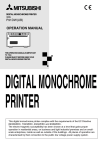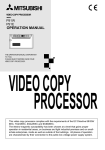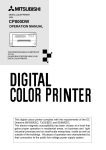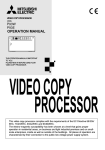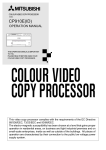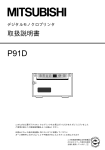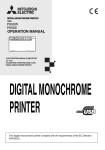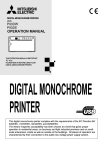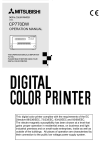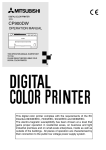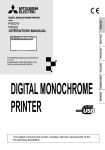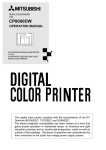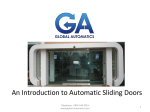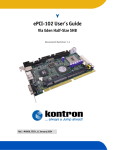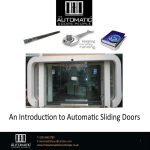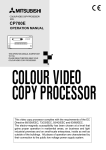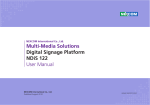Download Mitsubishi Electronics P91DW User's Manual
Transcript
DIGITAL MONOCHROME PRINTER
MODEL
P91DW
OPERATION MANUAL
FUNC
DOWN
UP
COPY
SET
GAMMA
FEED
OPEN
THIS OPERATION MANUAL IS IMPORTANT
TO YOU.
PLEASE READ IT BEFORE USING YOUR
DIGITAL MONOCHROME PRINTER.
DIGITAL MONOCHROME
PRINTER
This digital monochrome printer complies with the requirements of the EC Directive
89/336/EEC, 73/23/EEC, 93/42/EEC and 93/68/EEC.
The electro-magnetic susceptibility has been chosen at a level that gains proper
operation in residential areas, on business and light industrial premises and on smallscale enterprises, inside as well as outside of the buildings. All places of operation are
characterised by their connection to the public low voltage power supply system.
WARNING:
Use the AC power cord recommended as below and a parallel cable (Hewlett Packard
C2951A, etc.) so as not to interfere with radio and television reception.
If you use other cables, it causes interference with radio and television reception.
WARNING:
Use the AC power cord according to the recommendations as below,
Case 1, 2, 3 and 4; in order to comply with UL2601-1 and CAN/CSA C22.2 No. 601.1.
Case 5; in order to comply with EN60601-1 and EN60950.
Case 1. Connect to the 120V receptacle of the room or the host equipment.
The AC power cord should be UL or CSA approved and consist of type SJT, size
16 or 18AWG, length 2.5m or shorter cord with IEC320/C13 type, 125V 10A or
higher rating connector and NEMA 5-15 type, 125V 10A or higher rating, Hospital
Grade plug.
Case 2. Connect to the 230V receptacle of the room or the host equipment.
The AC power cord should be UL or CSA approved and consist of type SJT, size
16 or 18AWG, length 2.5m or shorter cord with IEC320/C13 type, 250V 10A or
higher rating connector and NEMA 6-15 type, 250V 10A or higher rating, Hospital
Grade plug.
Case 3. Connect to the 120V receptacle of the host equipment.
The AC power cord should be UL or CSA approved and consist of type SJT, size
16 or 18AWG, length 2.5m or shorter cord with IEC320/C13 type, 125V 10A or
higher rating connector and IEC320-2.2/E type, 125V 10A or higher rating plug.
Case 4. Connect to the 230V receptacle of the host equipment.
The AC power cord should be UL or CSA approved and consist of type SJT, size
16 or 18AWG, length 2.5m or shorter cord with IEC320/C13 type, 250V 10A or
higher rating connector and IEC320-2.2/E type, 250V 10A or higher rating plug.
Case 5. Connect to the 230V receptacle of the room or the host equipment.
The AC power cord should be VDE approved and consist of core size 1mm2 or
bigger, length 2.5m or shorter cord with IEC320/C13 type, 250V 10A or higher
rating connector and CEE(7)VII type or IEC 320-2.2/E type, 250V 10A or higher
rating plug.
NOTE:
This equipment has been tested and found to comply with the limits for a Class A digital
device, pursuant to Part 15 of the FCC Rules.
These limits are designed to provide reasonable protection against harmful interference
when the equipment is operated in a commercial environment. This equipment generates,
uses, and can radiate radio frequency energy and, if not installed and used in accordance
with the instruction manual, may cause harmful interference to radio communications.
Operation of this equipment in a residential area is likely to cause harmful interference in
which case the user will be required to correct the interference at his or her own expense.
Information:
This class A digital apparatus complies with Canadian ICES-003.
Cet appareil numérique de la classe A est conforme à la norme NMB-003 du Canada.
"CLASSIFIED BY UNDERWRITERS LABORATORIES INC.®
WITH RESPECT TO ELECTRIC SHOCK, FIRE AND MECHANICAL HAZARDS ONLY IN
ACCORDANCE WITH UL2601-1 AND CAN/CSA C22.2 No. 601.1"
CAUTION
RISK OF ELECTRIC SHOCK
DO NOT OPEN
CAUTION:
TO REDUCE THE RISK OF ELECTRIC
SHOCK,
DO NOT REMOVE COVER (OR BACK)
NO USER-SERVICEABLE PARTS INSIDE
REFER SERVICING TO QUALIFIED SERVICE PERSONNEL.
The lightning flash with arrowhead symbol, within an
equilateral triangle, is intended to alert the user to the
presence of uninsulated "dangerous voltage" within the
product's enclosure that may be of sufficient magnitude
to constitute a risk of electric shock.
The exclamation point within an equilateral triangle is
intended to alert the user to the presence of important
operating and maintenance (servicing) instructions in the
literature accompanying the appliance.
WARNING:
TO PREVENT FIRE OR SHOCK HAZARD, DO NOT EXPOSE THIS APPLIANCE
TO RAIN OR MOISTURE.
This product is to be employed with medical equipment, just for
reference purpose, not for medical diagnostic purpose.
1
1
2
3
4
5
6
7
8
9
A
B
C
D
E
F
CONTENTS
CONTENTS ................................................................. 1
PRECAUTIONS ..................................................... 2 - 4
UNPACKING ............................................................... 5
FEATURES AND FUNCTIONS
Front Panel .............................................................. 6
Rear Panel ............................................................... 7
INSTALLATION OF PAPER .................................. 8 - 9
EXAMPLE OF CONNECTION .................................. 10
PRINTING .......................................................... 11 - 12
ADJUSTMENT OF PRINT PICTURE
Selection of Gamma (γ) Curve ............................. 13
SETTING OF FUNCTION MODE ...................... 14 - 15
ERROR DISPLAY .............................................. 16 - 17
STATUS AND MODES .............................................. 18
USE OF CLEANING PAPER .................................... 19
PARALLEL DATA INTERFACE ......................... 20 - 22
MAINTENANCE ........................................................ 23
SPECIFICATIONS .................................................... 24
1
2
PRECAUTIONS
In the interest of safety, please observe the following precautions:
POWER REQUIREMENT
This Digital monochrome printer is designed for operation on 120/220-240V AC 50/60Hz in U.S.A and Canada,
220-240V AC 50/60Hz in Europe. Never connect to any
outlet or power supply having a different voltage or fre-
quency.
WARNING : THIS APPARATUS MUST BE EARTHED.
AVERTISSEMENT : CET APPAREIL DOIT ETRE MIS A
LA TERRE.
This equipment is classified as class 1, type B according
to the type of protection against electric shock.
PROTECTIVE MEASURES
IF ABNORMALITIES ARISE, . . .
Use of the unit during emission of smoke or abnormal
sounds (without adopting countermeasures) is dangerous.
In such a case, unplug the power cord from the source
outlet immediately, and request maintenance services from
the sales dealer.
DO NOT REMOVE THE CABINET
Touching internal parts is dangerous, besides, it may lead
to malfunction. Contact the sales dealer to carry out internal checks and/or adjustments. Before opening the cover
for eliminating a jammed paper, etc., be sure to disconnect the power cord plug.
NEVER INSERT ANY OBJECT INTO THE UNIT
Foreign objects of any kind inserted into this unit constitute a safety hazard and can cause extensive damage.
If any object should be inserted into the unit, unplug the
power cord, then contact the sales dealer.
PLACE THE UNIT ON A HORIZONTAL LEVEL
The unit is likely to be affected if it is placed in slanted
conditions or in unstable places.
DO NOT PLACE ANYTHING ON THE UNIT
Heavy objects placed on the unit can cause damage or
obstruct proper ventilation.
PROTECT THE POWER CORD
Damage to the power cord may cause fire or shock hazard. When unplugging, hold by the plug only and remove
carefully.
Never put a heavy thing on the power cord. The cord may
be damaged causing a fire or electric shock.
DO NOT PLACE WATER CONTAINERS ON THE UNIT
Do not place flower vases, and other water-holding containers on the unit. If, for some reason, water seeps to the
inside of the unit, unplug the power cord from the
source outlet, and contact the sales dealer. If used without
corrective measures, the unit may be damaged.
PROTECT AGAINST DEW FORMATION
In extremely cold regions, if the unit is moved quickly from
an extremely cold place to a warmer one, dew is likely to
be formed. If dew is formed, printing is not possible.
OPERATING AMBIENT TEMPERATURE RANGE
The operating ambient temperature range is 5°C-40°C
(41°F-104°F), and humidity of 20-80%.
BE CAREFUL AROUND PRINT PAPER EXIT SLIT
Do not insert your hand or any material into the paper exit
slit during printing.
Do not touch the cutter blade inside the paper exit slit.
Otherwise, your finger will be injured.
DO NOT TOUCH THE THERMAL HEAD AND CUTTER
Do not touch your hand to the thermal head (located inside the unit) and the cutter blade.
The thermal head is heated to high temperature.
This may cause injury.
INSTALLATION LOCATIONS
MAINTAIN GOOD VENTILATION
Ventilation slots and holes are provided on sides of this
unit.
Place the unit on a hard and level surface and locate at
least 4" (10cm) from walls to ensure proper ventilation.
PLACES NOT LIKELY TO BE EXTREMELY HOT
Places exposed to direct sunlight, or near heating
appliances can attain extremely high temperatures, which
may deform the cabinet, or can become a prime cause of
damage.
UNSUITABLE LOCATIONS
Avoid shaky places or hot-springs areas where hydrogen
sulfide and acidic ions are likely to be generated.
SET THE UNIT ON A FLAT PLACE
Do not use the unit in the state inclined ±20° in vertical or
horizontal direction, or in an unstable place.
It will disturb paper feeding or ventilation, or affects the
set.
PLACES WITH HIGH HUMIDITY AND DUST
Do not place the unit at locations with high humidity and/or
dust. They can cause extensive damage.
Avoid places where the unit is likely to contact oily fumes
and vapors.
2
FOR LONG OPERATING LIFE
UNSUITABLE MATERIALS FOR THE UNIT
Many plastic components are used in the backside. Coat
flaking and deformation are likely to occur if the unit is wiped
with chemical dusters, benzine, thinner or any other solvent, if rubbers or PVC items are left in contact with the
unit for extended duration, or if the unit is sprayed with
insecticide.
CARE OF THE CABINET
Unplug and clean with a soft cloth slightly moistened with
a mild soap and water solution. Allow to dry completely
before operating. Never use petroleum base solutions or
abrasive cleaners.
HEAD ABRASION
The thermal head, like the video head, wears out.
When it is abraded, it becomes hard to print out fine details
of the picture. In such a case, it is necessary to replace the
thermal head. Consult with the sales dealer for replacing
the head.
WHEN A DEFECT IS FOUND
When you detect smoke or smell from the unit, disconnect
immediately the power cord plug from a wall socket and
ask the agent for repair. Dangerous if the unit is operated
in that state.
CONNECTION DEVICES
Read thoroughly "Operating Precautions" of the instruction booklets for other devices connected with the Digital
monochrome printer.
Do not disconnect the power cord during printing.
CAUTION ON RELOCATING
When transporting this unit, make sure it is not likely to be
subjected to impacts. They can be a prime cause for damage. Further, make sure to disconnect the power cord from
the power outlet, and the cables from the connected devices.
UNPLUG THE POWER CORD DURING A LONG
ABSENCE
Turn off the MAIN power switch and unplug the power cord
during a long absence.
THERMAL PAPER
2
2
2
2
2
2
2
2
2
When the remaining length of the paper is about10"
(25cm), a color belt appears at the paper end.
Prepare for replacement of the paper. If the
remaining paper length is less than 10" (25cm),
printing becomes uneven due to the uneven
paper core surface.
When the Printed paper is touched by wet hand,
the print may be discolored.
When the paper runs out during printing, the printing
operation stops and "EP" is displayed by the indicator
on the front panel. Install new paper at this time.
Store the printed paper in a place with low humidity
free from a direct sunlight.
If the paper absorbs nonvolatile organic solvents
(alcohol, ester, ketone, etc.) the print may be
discolored.
Particularly, if the paper comes in contact with soft
vinyl chloride such as a transparent tape, it quickens
discoloration.
Do not use paper other than the specified one.
Immediately after the paper is replaced, 2-3 images
may be printed with a blank part due to hand's dust
or oil.
Avoid a direct sunlight or a place near a heater,
and store the paper in a place with 30°C ( 86°F)
or lower temperature and 35-80% RH.
2
When the paper is rapidly transferred from a cool
place to a hot place, a vapor or a dew is generated
on the paper surface causing paper jam or degraded
printing quality.
A finger print or dust on the paper surface may
degrade the printing quality.
Note:
Mitsubishi brand thermal paper is specially treated
with an antistatic coating against thermal head
damage caused by static-electricity discharge.
The use of non-treated paper may cause premature
head failure in your product.
3
SAFETY TECHNICAL CHECKS
Periods: According to the recommendations of the manufacturer of medical device.
Scope: a) Visual check
Housing, cables, operator controls, readout device ( displays, LED etc.), labels, accessories,
instruction manual.
b) Function test
Performance check acc. instruction manual, also unity and applicability of set and accessory test.
c) Electrical check
Safety electrical test of the configuration in accordance with EN60601-1.
“ In the interest of safety, avoid the handling of liquids beside the set.”
RESPONSIBILITY OF THE MANUFACTURER
The manufacturer, assembler, installer or importer considers himself responsible for the effects on safety, reliability
and performance of the EQUIPMENT only if:
– assembly operations, extensions, readjustments, modifications or repairs are carried out by persons authorized by
him, and
– the electrical installation of the relevant room complies with the IEC requirements
– the EQUIPMENT is used in accordance with the instructions for use.
•
Any service after expiration of the warranty period will be made at cost. Consult our service station in your place.
TECHNICAL DESCRIPTION
The supplier will make available on request such circuit diagrams, component part lists, descriptions, calibration
instructions or other information which will assist the USER's appropriately qualified technical personnel to repair
those parts of the EQUIPMENT which are classified by the manufacturer as repairable.
The use of ACCESSORY equipment not complying with the equivalent safety requirements of this equipment may
lead to a reduced level of safety of the resulting system. Consideration relating to the choice shall include:
– use of the accessory in the PATIENT VICINITY
– evidence that the safety certification of the ACCESSORY has been performed in accordance to the appropriate
EN60601-1 and/or EN60601-1-1 harmonized national standard.
The transportation and storage environmental conditions are:
Temperature
: -20°C - +60°C (-4°F - +140°F)
Humidity : 90%RH or less at 40°C (104°F)
Note : The above transportation environmental conditions indicate the storage environmental conditions
during transport.
4
3
UNPACKING
Take the unit out of the box by the following procedures. Make sure to check the
contents.
1 Open the top of the box.
3 Take the unit out of the box carefully.
• Make sure to
keep the unit
horizontal.
2 Remove the cushion above the unit.
4 Unwrap the unit.
FUNC
DOWN
UP
SET
GAMMA
FEED
COPY
Accessories
Thermal paper
AC power cord
Cleaning paper
Operation manual
Printer driver (1 floppy disk)
5
4
FEATURES AND FUNCTIONS
Front Panel
1 2345 6 7 8 9
FUNC
DOWN
UP
COPY
SET
GAMMA
B
FEED
OPEN
A
Name
1
2
3
4
5
6
7
8
9
A
B
Function
Reference
page
Power switch
Turns on/off the power.
FUNC button
Function mode changes whenever FUNC
is pressed.
DOWN button
Press to change the value in function
mode.
15
UP button
Press to change the value in function
mode.
15
SET button
Press to set each function value and γcurve.
-
Indicator
Displays stand-by, functions and error
messages.
15-17
GAMMA button
Press to change the γ-curve.
13
FEED button
Press to feed the paper.
12
COPY button
Press for additional copies of the previous
printout.
11
Print exit/Cutter
Printed paper will come out through this
slot. Cut the printed paper here.
-
Lever
Opens the door.
-
6
14•15
Rear Panel
OFF
PARALLEL DATA IN
OFF
C
1 2 3 4
LOCK
ON
OFF
ON
1 2 3 4
D
AC LINE
E
F POTENTIAL EQUALIZATION
TERMINAL
This is used to equalize the potential of the equipment
connected to this unit.
For details refer to the installation instruction of
equipment to be connected.
Name
C
D
E
F
Function
Reference
page
Mode switches
Select special functions.
10
PARALLEL data terminal
Connects to the device equipped with
parallel data interface such as personal
computer.
10
20 - 22
Power terminal (AC LINE)
Connect the power cord to this terminal.
-
Potential equalization terminal
Makes the connected equipment of
potential equal.
-
7
5
INSTALLATION OF PAPER
Moisture, fingerprints or dust on the
paper surface may cause a noise at
printing or deterioration in print
quality. Set the paper in the following
procedure to prevent adhesion of
fingerprint or dust on the paper
surface.
1 Open the door.
OPEN
• Switch the lever
located on the
left side to the
“OPEN” position.
3 Pull out the paper end.
• Pull out the first 1520cm (6 in. - 9 in.) of
the paper to remove
any slack in the roll.
4 Close the door.
The door opens.
2 Load the paper roll.
•Place the paper roll
in the printer.
5 Cut the paper end.
printing side
cutter
INCORRECT
CORRECT
Note: The printing surface is the outside.
Place the paper with the thermosensitive side (printing side) up.
When the paper roll is placed
inversely, images can not be printed.
• Cut the paper end with the cutter just like
tearing off the paper.
8
When setting the paper, observe the following
precautions to prevent paper jam.
Do not use defective paper.
Do not use the bent or wrinkled
paper.
Adjust the paper position correctly.
When the paper is fed out skewed
from the print exit, adjust the paper
position so that it is fed out straight.
Do not slack the roll paper.
Set the paper tightly to remove any
slack.
If the side of the print paper is uneven or the core is sticking out, the amount of paper
feeding after printing may vary.
When the side of paper is uneven or the core is sticking out, install the print paper after
making the paper side even.
The core is sticking out.
The paper is uneven.
Make the paper side even.
CORRECT
INCORRECT
CAUTION
• Keep the high-density paper away from fingerprint, dust or moisture when storing it.
• Do not touch the rubber roller. Do not stain or damage the roller surface.
• Do not touch the thermal head (located behind the cutter). When printing, the thermal
head is heated to high temperature.
• Do not touch the cutter blade.
9
6
EXAMPLE OF CONNECTION
Connecting to various equipment with parallel data interface
such as medical equipment and personal computer.
Connection
1 Turn off the power switches of the digital monochrome printer
and the equipment to be connected.
2 Connect the digital monochrome printer with PC or medical
equipment through a parallel cable.
3 When inserting the parallel cable to the printer's connector,
make sure to fasten the springs at the both sides of the
connector to secure the cable.
Personal computer or
medical equipment
To PARALLEL
DATA IN
connector
1 2 3 4
LOCK
ON
OFF
PARALLEL DATA IN
OFF
ON
OFF
1 2 3 4
AC LINE
Connect
Power cord
Rear panel
Mode switch setting
1 2 3 4
LOCK
ON
OFF
ON
OFF
OFF
Set the mode switches on the rear panel.
• When setting the switch No. 1 to ON, FUNC, DOWN, UP, SET and
GAMMA buttons will be locked. (The functions will not be available.)
Set the switches other than No. 1 to OFF.
1 2 3 4
Installing printer driver
Printer driver is required to print the data from a personal computer connected with this
printer.
The printer driver for Windows® is supplied with this printer.
Product name
For Windows®
Operating conditions
Applies for Microsoft® WindowsNT®4.0
Refer to the operation manual of the printer driver or "Read me" for installing.
WindowsNT® is the registered trademarks of Microsoft Corporation in the U.S.A and other
countries.
10
7
PRINTING
Printing procedure
1 Turn on the power.
3 Cut the printed paper.
• Press the
“POWER”
switch to turn
on the power.
• Cut the printed
paper with the
cutter by
tearing off the
paper in the
upper right
cutter
direction.
2 Print a picture displayed on the screen.
• Print a picture with an application
software. The image data is transferred
through parallel data interface.
Copy printing
2 You can set the number of copies by
pressing the COPY button on the front
panel. You can copy the same picture as
many times as you desire until a new
image data is printed.
COPY
2 When the COPY button is pressed during
copy printing, the current image will be
completed and the rest will not be printed.
2 The set number of the copy printing will
Indicator
-
not be memorized.
: number of copies
: continuous printing
COPY printing mode
11
Paper feeding
2 By pressing the "FEED" button on the
front panel, you can feed the paper.
FEED
Precautions on Printing
2 If printing is continued with a very black picture, the printer will become overheated and
2
printing will not be available. "
" is indicated, and the button functions become invalid.
In this case, wait for a while until the unit is cooled down.
Avoid pulling out or holding the recording paper during printing or copying.
It can cause paper jam. Do not touch the paper until printing or copying ends.
Paper saving mode
2 When the paper saving mode switch is set to "
" in the function mode, print feeding
length is shorter than normal condition.
Before cutting the print, press the FEED button on the front panel to advance the paper.
12
8
ADJUSTMENT OF PRINT PICTURE
Selection of Gamma (γ) Curve
You can select γ-curve by pressing the gamma button " ".
Each time the button is pressed, the indicator and γ-curve
number is switched. After a γ-curve number has been
selected, press the "SET" button to store the γ-curve number.
FUNC
DOWN
UP
SET
GAMMA
Indicator/Adjustable Item
γ−curve set
mode
FEED
Adjustable contents
This is the mode to select the gamma (γ) curve (density
diagram characteristic) to get the proper density for each
printing image. Select the best one among the five gamma
curves.
13
9
SETTING OF FUNCTION MODE
1 Select a function mode by pressing the FUNC button.
FUNC
DOWN
UP
SET
GAMMA
•
FEED
Each time the FUNC button is pressed, the mode is switched as shown below.
Standby
Paper type selection mode
Paper saving mode
Set condition printing mode
Buzzer set mode
14
2 Adjust a numeric value by pressing } or { button.
FUNC
DOWN
UP
SET
GAMMA
Adjustable items of each function mode are as follows.
Indicator/Adjustable
item
Adjustment contents
Paper type
selection
mode
Mode to select paper type.
: Standard paper
: High density paper
Paper saving
mode
Mode to select paper saving mode.
: Paper saving mode OFF
: Paper saving mode ON
Printer condition printing
mode
Buzzer set
mode
Mode to select whether the printer conditions will be printed
over the image or not.
: The printer conditions are not printed.
: The printer conditions are printed.
Mode to select whether the buzzer will sound or not.
: Buzzer does not sound. (Sounds only at occurrence of
error)
: Buzzer sounds.
3 When completing setting the function, press the SET button.
The set functions will not be lost even if the power is turned off.
15
FEED
10
ERROR DISPLAY
When an error in operation occurs, an audible alarm and a
visible error is displayed in the LED indicator.
Cause/Error display
1 No paper
Symptom/Remedy
[Symptom]
• When the paper runs out or the paper is not installed, printing
becomes impossible and alarm tone is given.
In this case, all the functions of buttons and switches become
invalid.
[Remedy]
Install brand-new paper according to "5. INSTALLATION OF
PAPER" on page 8.
Cause/Error display
2 Overheat
Symptom/Remedy
[Symptom]
• When the head gets overheated, "
" is displayed on the
indicator and alarm tone is given.
In this case, all the functions of buttons and switches
become invalid.
[Remedy]
Wait until the head is cooled down.
Cause/Error display
3 Button input
error
Symptom/Remedy
[Symptom]
• An alarm tone is given once, "
" is displayed for one second
in the indicator, and button operation is nullified in the following
cases:
• The COPY button is pressed first after the power is turned
on.
• The DOWN, UP, SET or GAMMA button is pressed when
the MODE switch No. 1 is set to ON.
• Any button on the front panel is pressed when one of the
other error messages is displayed on the LED.
16
Symptom/Remedy
Cause/Error display
4 Door error
[Symptom]
• When the door opens, an alarm tone is given.
[Remedy]
Close the door.
Cause/Error display
5 Gear lock error
Symptom/Remedy
[Symptom]
• When the thermal head does not automatically go up after
printing, an alarm tone is given.
• "
" is displayed in the indicator and all the functions of buttons
and switches become invalid.
[Remedy]
Turn the power off. Then turn it on again.
17
11
STATUS AND MODES
Set state/Mode
LED display
Point and
Left
right
Contents of right
side LED display
Power off
Power off
Stand-by
Print state
During data receiving
During printing
Copy state
,
γ-curve set mode (γ-curve)
Number of copies
γ-curve No.
Paper type setting mode
,
Paper saving mode
,
Set condition printing mode
,
Out/ In (OFF/ON)
Buzzer setting mode
,
Out/ In (OFF/ON)
Standard / High density
Out/ In (OFF/ON)
Overheat
No paper
Error detect state
Button input error
Door is open.
Gear lock
18
12
USE OF CLEANING PAPER
When the thermal head is dirty with dust and perspiration, etc., white spots or stripes may
appear on the print. In this case, clean the thermal head in the following procedure BY
USING THE SUPPLIED CLEANING PAPER.
1
4
Turn on the power.
Close the door.
Press the "POWER"
switch to turn on the
power.
2
Close the door
without taking out
the cleaning paper.
Open the door.
Switch the left side
lever to the "OPEN"
position.
OPEN
5
Press the "FEED" button.
FEED
3
Insert the cleaning paper.
Roll the cleaning
paper and install
into the set.
6
Keep pressing the
"FEED" button until
you hear a beep.
Take out the cleaning paper.
Open the door.
Cleaning paper
Red mark
Adjust the red mark
on the cleaning
paper parallel to the
platen roller.
OPEN
Take out the
cleaning paper.
Do not pull out the
cleaning paper while
the door is closed.
7 Repeat the steps 3-6 by 2 or 3 times,
and print 1-2 sheets to verify the
cleaning effect.
Platen roller Cleaning paper
CAUTION
0 It is recommended that after printing 10 rolls of paper the unit be cleaned using the supplied cleaning paper.
0 If the symptom of the dirty head is not corrected even after cleaning, your set needs repairing, contact your dealer.
0 Do not pull out the sheet and the cleaning paper while the door is closed.
This may cause extensive damage on the unit.
0 Never use other cleaning papers. It may cause damage to the thermal head.
0 This cleaning paper should be used only for cleaning the thermal head. Do not use it for other purpose.
19
13
PARALLEL DATA INTERFACE
PARALLEL TERMINAL SIGNAL
• Connector JD36SL or equivalent (36 pin)
• Input level TTL
• Parallel input connector port
Signal allocation (Signal : Compatible)
Pin No. Return
pin No.
1
19
2
3
4
5
6
7
8
9
10
20
21
22
23
24
25
26
27
28
11
29
13
14
16•17
18
19 - 30
31
16
1
36
19
Signal
From/To
Function
STROBE
PC/DP
DATA1(LSB)
DATA2
DATA3
DATA4
DATA5
DATA6
DATA7
DATA8(MSB)
PC/DP
PC/DP
PC/DP
PC/DP
PC/DP
PC/DP
PC/DP
PC/DP
Strobe pulse for data reading. Incoming pulse width shoud be
0.5µs minimum. At regular conditions, “High” data will be read
after becoming “Low”.
High: data 1
Low: data 0
ACK
(ACKNOWLEDGE)
PC/DP
The signal is yielded after data input has ended by a data
reception acknowledgement pulse.
BUSY
PC/DP
High: DP data is not accepted.
Low: DP data is accepted.
The signal becomes “High” in the following cases:
• During data entry
PC/DP
P•E
(PAPAER END)
12
Pin number
18
SELECT
AutoFd
GND
High
GND
INIT
32
Fault
15•
33 - 35
36
NC
SelectIn
Information will be expressed for parallel data of every signal
from bit No.1 to No.8.
High: No paper
Low: Paper available
PC/DP
High
PC/DP
PC/DP
PC/DP
High
Earth
PeripheralLogicHigh
Earth
PC/DP
Clears sending data to this unit. (Low) Incoming pulse width
should be 100µs minimum.
Low: Abnormal condition occurs in DP. (e.g. error)
PC/DP
Unused
PC/DP
Low
DP : Digital printer
PC : Personal computer
20
• Parallel input connector port
Signal allocation (Signal : Nibble)
Pin No. Return
pin No.
1
19
2 - 9 20 - 27
28
10
11
29
12
13
14
16•17
18
19 - 30
31
16
Signal
From/To
HostClk
PC/DP
PC/DP
PC/DP
Unknown
PrtClk
PtrBusy
PC/DP
AckDataReq
Xflag
HostBusy
PC/DP
GND
High
GND
Init
32
DataAvail
15•
33 - 35
36
NC
1284 Active
PC/DP
PC/DP
PC/DP
PC/DP
Function
High
Unknown
Sends data in “Low” when HostBusy is “Low”. After HostBusy
turns “High”, this signal becomes “High”.
Data4, Data8(MSB)
Data3, Data7
Data2, Data6
High: DP is on BUSY status.
Low: DP can send data.
Earth
PeripheralLogicHigh
Earth
Clears sending data to this unit. (Low) Incoming pulse width
should be 100µs minimum.
Data1(LSB), Data5
Unused
PC/DP
Becomes “High” when DP requests each mode of IEEE1284.
21
• Parallel input connector port
Signal allocation (Signal : ECP)
Pin No. Return
pin No.
1
19
2
3
4
5
6
7
8
9
Signal
From/To
HostClk
PC/DP
Function
Forward data transfer : Becomes “Low” when PeriphAck is
“Low” and there is data to be read. Returns to “High” when
PeriphAck becomes “High”.
High: data 1
Low: data 0
DATA1(LSB)
DATA2
DATA3
DATA4
DATA5
DATA6
DATA7
DATA8(MSB)
PeriphClk
PC/DP
PC/DP
PC/DP
PC/DP
PC/DP
PC/DP
PC/DP
PC/DP
10
20
21
22
23
24
25
26
27
28
PC/DP
Reverse data transfer : Sends “Low” data when HostAck is
“Low”. Returns to “High” when HostAck becomes “High”.
11
29
PeriphAck
PC/DP
AckReverse
PC/DP
Forward data transfer:
High: DP is on BUSY status.
Low: DP can accept data.
High: Forward data transfer (Receive)
Low: Reverse data transfer (Send)
12
Xflag
13
14
16•17
18
19 - 30
31
32
15•
33 - 35
36
16
PC/DP
HostAck
PC/DP
GND
High
GND
PC/DP
PC/DP
PC/DP
Reverse Request
Periph Request
NC
PC/DP
1284 Active
PC/DP
Information will be expressed for parallel data of every signal
from bit No.1 to No.8.
High: During supporting ECP mode
Reverse data transfer:
High: PC is on BUSY status.
Low: PC can send data.
Earth
PeripheralLogicHigh
Earth
Low : When PC requests DP to send data
Low : When DP requests PC to send data
Unused
Becomes “High” when DP requests each mode of IEEE1284.
22
14
MAINTENANCE
Turn off the power for maintenance.
Maintenance of Main Unit
Wipe off stains of the front panel with a soft cloth.
When the panel is heavily stained, wipe of with the cloth
moistened with neutral cleanser diluted by water and finish with
a dry cloth.
Maintenance of Rubber Roller
When the rubber roller is dirty with dust, etc., a black spot may
appear on the print.
In this case, eliminate the dust on to the rubber roller with a
blower or a brush.
Rubber roller
Cleaning of Thermal Head
When the thermal head is dirty with dust, etc., white spots or
stripes may appear on the print.
In this case, clean the thermal head according to "12. USE OF
CLEANING PAPER".
Note: After installation of new roll of paper, dust on the paper will
generally require 2 to 3 prints to be made before the dust
is eliminated.
23
15
SPECIFICATIONS
Type:
Digital Monochrome Printer
Model:
P91DW
Power supply and
power consumption:
120V AC, 50/60Hz, 1.4A
220-240V AC, 50/60Hz, 0.8A
Connection terminal:
Parallel data interface (36 pin female type)
Dot resolution:
1024 x 1024 pixels (Standard)
(Max. 1024 x 5120 pixels)
Gradation:
256 gradations
Printing speed:
5.1 sec (Standard)
Print size:
4" x 4" (100mm x 100mm) (Standard)
(Max. 4" x 20" (100mm x 500mm))
Operating conditions:
Temperature 41 - 104˚F (5-40˚C)
Humidity
20 - 80% RH (No dewing)
External dimensions:
6.1" x 3.8" x 11.8" (154mm x 97mm x 300mm); W x H x D
Weight:
6.8 lbs (3.1kg)
Standard accessories:
AC power cord ........................................................... 1 piece
Thermal paper K65HM .................................................. 1 roll
Cleaning paper .......................................................... 1 sheet
Printer driver ...................................................... 1 floppy disk
Optional accessory:
Thermal paper K65HM, K65H, K61B, K61S
SERVICE INFORMATION
Before requesting service please review this operation manual to correct minor complaints.
If you are unable to correct the problem, consult your MITSUBISHI Dealer or MITSUBISHI
Service Department.
DO NOT ADJUST ANY CONTROLS NOT DESCRIBED IN THIS OPERATION MANUAL.
DO NOT REMOVE THE PROTECTIVE ENCLOSURE OF THIS UNIT.
24
MITSUBISHI ELECTRONICS AMERICA, INC.
5665 PLAZA DRIVE P.O. BOX 6007
CYPRESS, CA 90630-0007, USA
TEL (714)220-2500
FAX (714)236-6339
Mitsubishi Electric Europe B.V.
UK Branch
Travellers Lane, Hatfield, Herts. AL10 8XB, England, U.K.
Phone (1) 707 276100
FAX (1) 707 278755
German Branch
Gothaer Strasse 8, Postfach 1548, 40880 Ratingen 1, Germany
Phone (2102) 4860
FAX (2102) 486-732
French Branch
25, Boulevard des Bouvets - 92741 NANTERRE cedex
Phone (01) 55.68.55.00
FAX (01) 55.68.57.31
Italian Branch
Centro Direzionale Colleoni, Palazzo Perseo-Ingresso 2,
Via Paracelso 12, 20041 Agrate Brianza, (Milano) Italy
Phone (039) 60531
FAX (039) 6057694
Benelux Branch
Nijverheidsweg 23 A, 3641 RP. Postbus 222, 3640 AE Mijdrecht
Phone 02972-82461
FAX 02972-83936
Spanish Branch (Barcelona)
Sucursal en españa
Polígono Industrial "Can Magí", Calle Joan Bucallà 2-4,
Apartado de Correos 420, 08190 Sant Cugat del Vallês,
Barcelona, Spaín
Phone 93.5653154
FAX 93.5894388
Manufactured by Mitsubishi Electric Corporation
1 Zusho Baba, Nagaokakyo-City, Kyoto Japan
871C590A6
Made from recycled paper
PRINTED IN JAPAN




























